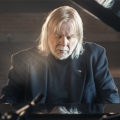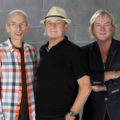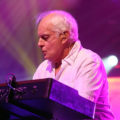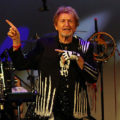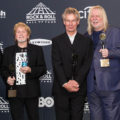“The Red Planet” reclaims keyboard wizard Rick Wakeman’s status as a chief prog god
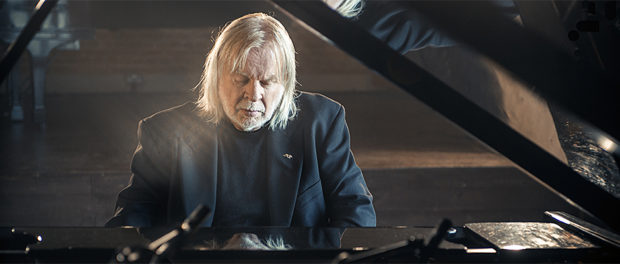 Photos provided by Chipster PR
Photos provided by Chipster PR
Keyboard virtuoso Rick Wakeman’s work with progressive rock torchbearers Yes needs no introduction, though when it comes to his superhuman solo career of more than 90 albums, the Rock and Roll Hall of Famer is a lot harder to pinpoint.
Since the early 1970s, he’s tackled numerous concept albums, several soundtracks, classical music, new age, ambient, gospel, Christmas and even comedy, gaining additional notoriety on the BBC’s “Grumpy Old Men” and a concurring, best-selling book series.
However, the release of “The Red Planet” marks the cape-clad composer’s long-awaited return to pure prog with the English Rock Ensemble (who last worked together in 2003), though its grand instrumental nature actually hearkens further back to his lauded debut, “The Six Wives of Henry VIII.”
The courteous and cheeky Wakeman beamed Chicago Concert Reviews aboard his spaceship of Mars-themed inspiration, then reminisced on being a sideman turned member of Strawbs, skipping an open slot in David Bowie’s band and joining Yes with its various offshoots.
 What led you to basing “The Red Planet” around Mars? Is this a lifelong interest or did inspiration come with the approaching 50th anniversary of its earliest expedition?
What led you to basing “The Red Planet” around Mars? Is this a lifelong interest or did inspiration come with the approaching 50th anniversary of its earliest expedition?
Rick Wakeman: A mixture of the two to be honest. I always thought it interesting that nearly every film about space made in the years from 1930 to 1970 all seemed to be based around “visitors” from Mars. Space comic books were the same, and as we got to learn more about Mars, it was obvious there were secrets there to be discovered. I am part of an organization called Starmus, which I was introduced to by [Queen guitarist] Brian May. It was founded initially by Garik Israelian, the brilliant astrophysicist, and professor Stephen Hawkins. Their festival always closed with music and I have had the honour of performing at the last four events, which were held in Tenerife and Switzerland, along with Hans Zimmer, Brian May, Steve Vai and many great artists.
Through Garik, I learned more and more about Mars and the fact that in recent years, more and more has been learned about the planet and its relationship with Earth. And when the current three mission return in March of 2021, we will know even more and it truly is extremely exciting for us all. On doing more research, I found the subject extremely musical, and inspiring, and so spent months composing around the areas of Mars that fascinated me. When you have a great subject of inspiration, then the music just seems to flow.
How would you describe the storyline and what you hope listeners will take away with them?
Wakeman: Think of Mars as a holiday destination and the album very much as the musical brochure. A lot of people have told me they have opened up photographic websites of Mars whilst listening to the album and can feel the connection.
Tell us a bit about the keyboards and any surprise instruments you used to compose this collection. How much digging did it require versus what’s been in your recent repertoire?
Wakeman: A lot of research. In fact, for four months, that’s pretty much all I did! I did not specifically choose instruments for any other reason than that of they produced sounds that I could hear the music and individual tracks needed, so there were the latest keyboards and software used, as well as classic 1970s synths, such as the mini Moog.

Photo by Andy Argyrakis
Wakeman: The music that I write tends to dictate what sort of album will come out at the end. I have wanted to do a full on keyboard prog album for years, but never had that inspirational subject…until Mars came along!
Before becoming a full-fledged prog god, you played keys for Strawbs. Can you give us your brief rundown of those years?
Wakeman: I loved my time with The Strawbs. It was a very innovative folk rock band. Richard “Hud” Hudson was a great percussionist and showman. [It] was so refreshing not to have a drummer, but all of his rhythmic skills at the band’s disposal. John Ford was ahead of his time with his bass sound and the way he played. He and “Hud” blended brilliantly and understood each other so well. Dave Cousins was, and still is, a great writer. His lyrics and acoustic guitar playing are superb, along with the recently, sadly departed Tony Hooper. Their perfectly matched vocals made Strawbs really unique. I played a Hammond L100, plus any other keyboards I could borrow or afford!
Shortly thereafter, you were asked to be a member of both David Bowie’s band The Spiders From Mars and Yes on the exact same day! Do you ever wonder what would’ve happened if history had been reversed or are you absolutely confident in the decision you made?
Wakeman: I’m 100% confident, simply because David Bowie told me I had made the right decision! Life certainly would have been different as David chopped and changed his musicians a lot, so by the mid 1970s, I could well have been out of work. David is still the most musically influential person I have ever had the honour to work with and to call a friend.
What were the best and worst parts of being in Yes?
Wakeman: The best and worst were often integrated! I only look back at the great stuff we managed to produce, like “Close To The Edge” and “Awaken.” That’s all that matters in the end…The music.
How do you feel perception towards the band’s music has changed? Did you ever expect to get the pioneering credit that’s finally coming everyone’s way?
 Wakeman: Not for me to decide to be honest. Perception will only really come after all the key members have departed this mortal coil, so once myself, [singer] Jon [Anderson], [guitarist] Steve [Howe], [drummer] Alan [White], [drummer] Bill [Bruford] and [guitarist] Trevor [Rabin] are all in a band on an astral plain somewhere, perception won’t be decided!
Wakeman: Not for me to decide to be honest. Perception will only really come after all the key members have departed this mortal coil, so once myself, [singer] Jon [Anderson], [guitarist] Steve [Howe], [drummer] Alan [White], [drummer] Bill [Bruford] and [guitarist] Trevor [Rabin] are all in a band on an astral plain somewhere, perception won’t be decided!
Can you share your opinions on how Anderson Bruford Wakeman Howe and Yes featuring ARW turned out?
Wakeman: Both ABWH and ARW were fabulous to be a part of as both units played Yes music as I felt it should be played. Great periods of my life.
Have you had a chance to read Steve Howe’s book yet, and if so, what’s your take?
Wakeman: No comment.
You’re quite an author and comedian in your own right. Do you have any projects in either of those areas coming down the pipeline?
Wakeman: I have another book in the pipeline, plus progressing with the “Rick’s Plaice” TV show on YouTube. Loads more music coming too, including a musical with Sir Tim Rice. So much still to do. Every day is exciting.
Once the world reopens, what are the chances of bringing “The Red Planet” to America, and specifically, the Chicago area?
Wakeman: I’d love that. We will be performing it at the Starmus Festival in September in Armenia, but I’d love to tour it in America. It requires a seven or eight-piece band to perform it and I’ve already lined up the musicians I’d like to use if I can bring it about. Truth is, it will be entirely down to a promoter willing to bring it to America and finance it.
How has your faith kept you sane during these crazy times?
Wakeman: Never wavers…
For additional information on Rick Wakeman, visit RWcc.com.

